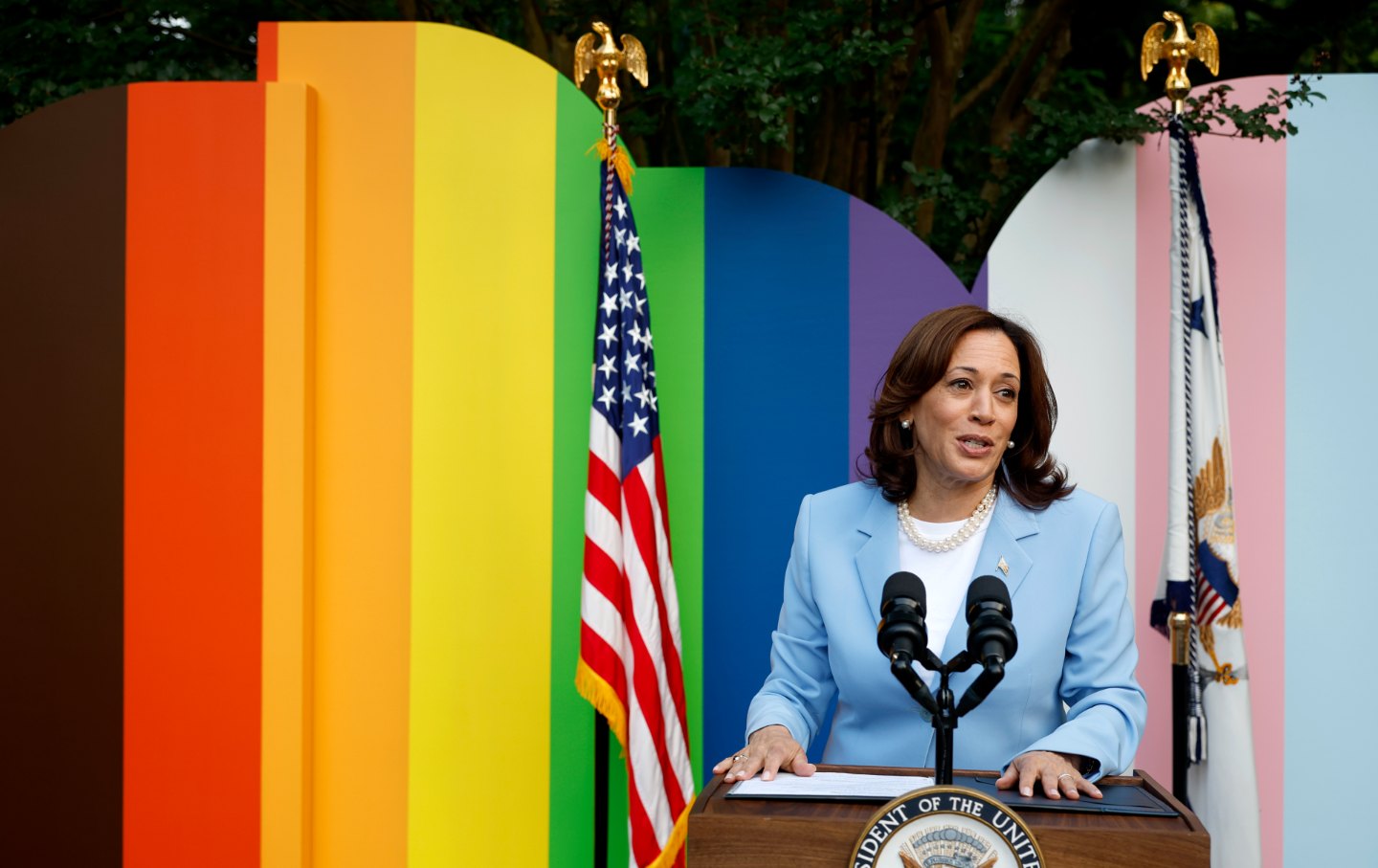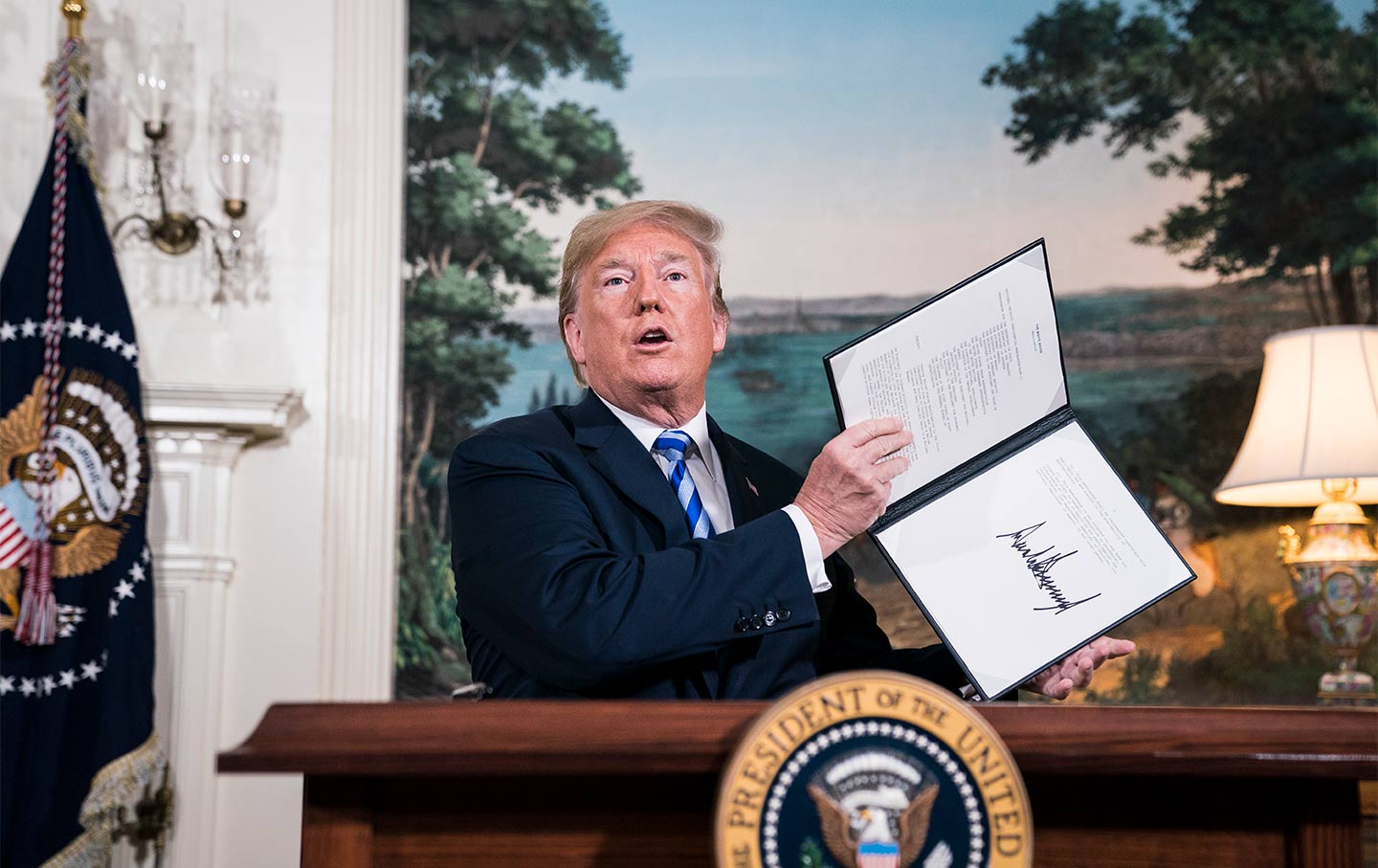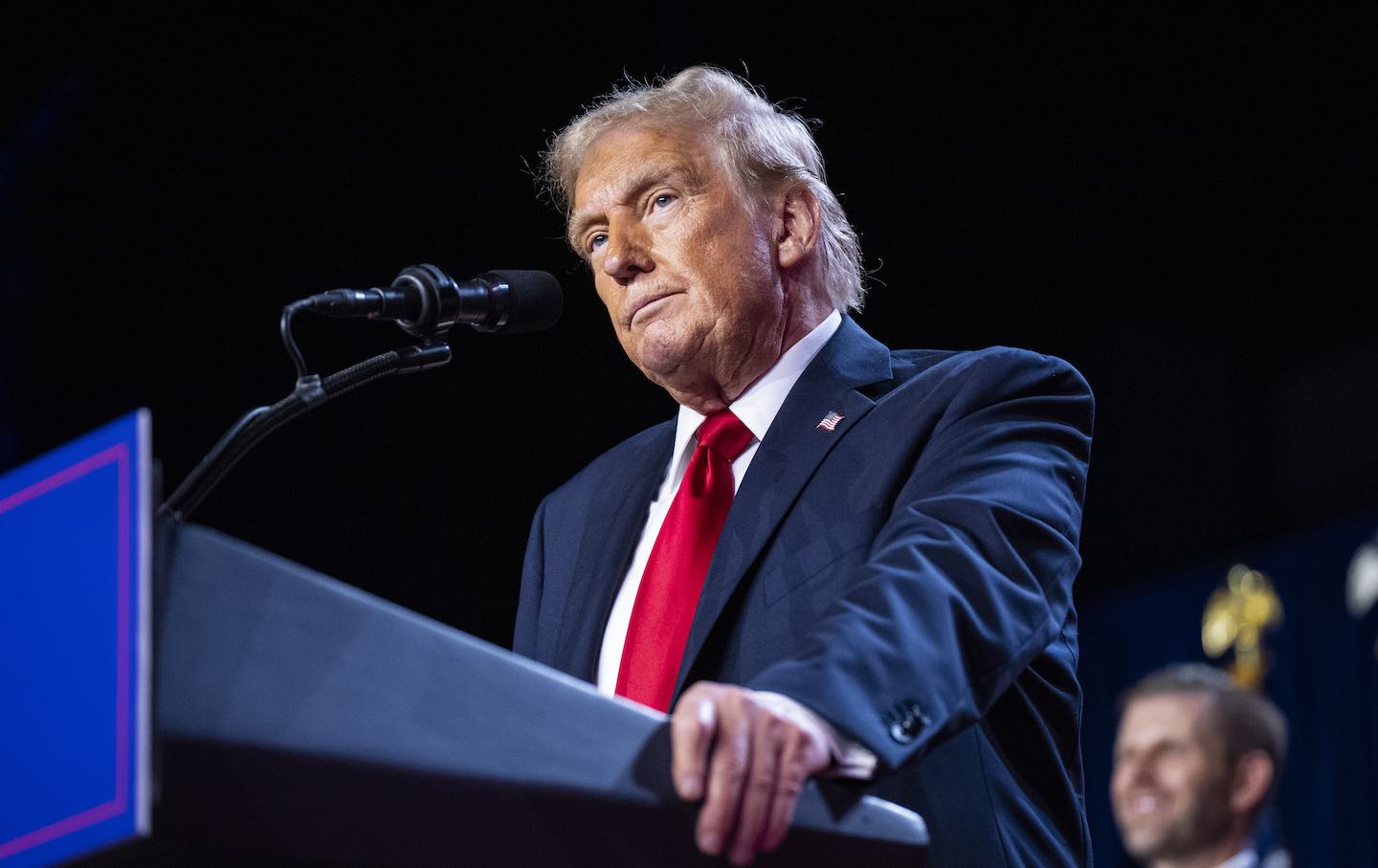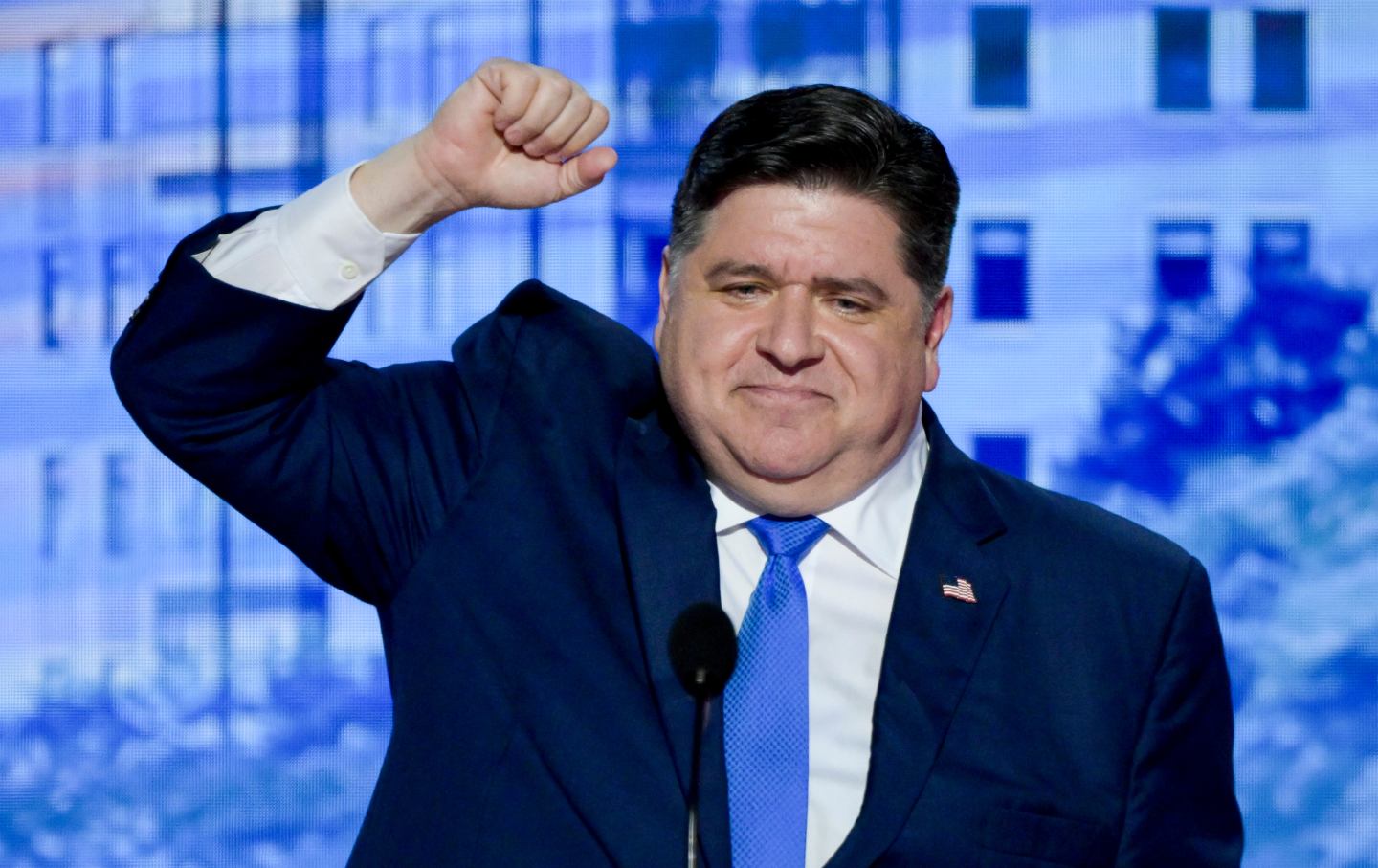As Childish Old Men Bickered, America Lost the Debate
The debate was a hard-to-watch 90-minute infomercial for the political shit show that lies ahead.
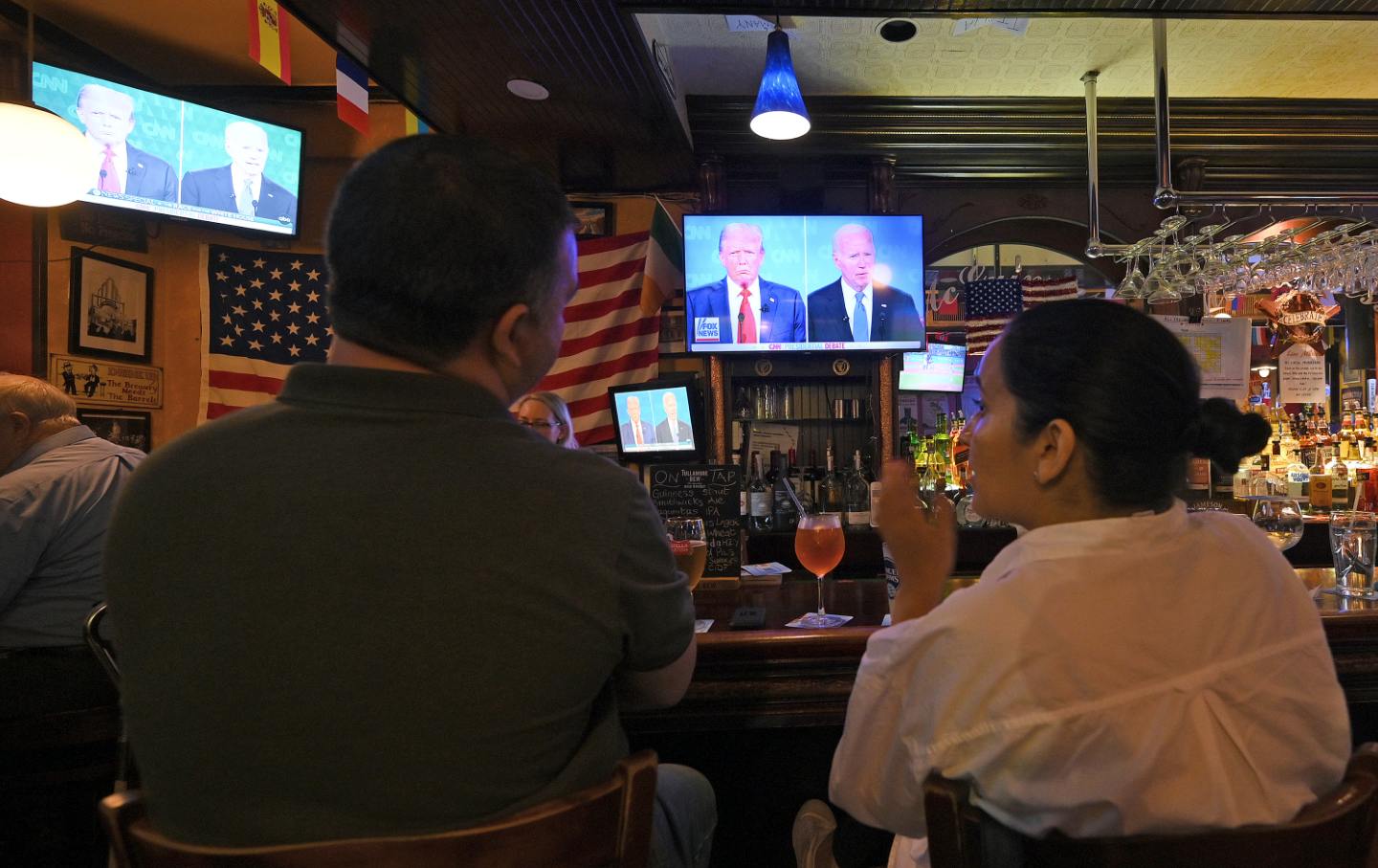
Patrons sit at the bar of an Irish pub as television screens show the 2024 presidential debate between Donald Trump and Joe Biden, in the Queens borough of New York City on June 27, 2024.
(Anthony Behar / Sipa USA via Ap Images)
A war criminal and a white-collar criminal walk into a bar—except it isn’t a bar, it’s CNN Studios in Atlanta, where the farce of American democracy is on display. In the days leading up to the year’s first presidential debate, Trump—his fundraising efforts boosted by his conviction—shouted about Biden being on drugs. The incumbent administration, meanwhile, continued cozying up to Israel, rubbing shoulders with its leaders and pledging support in the event of an all-out war with Lebanon. The Blue Line between Israel and Lebanon has been crossed thousands of times since October 7, while Israel flouted Biden’s so-called red line on Rafah. US weapons shipments continued despite Biden’s explicit acknowledgment that American bombs were being used to slaughter civilians. The death toll in Gaza is approaching 40,000, with 20,000 children buried or missing, and 500,000 Palestinians on the brink of starvation. Stateside, though, it’s circus season—and I, like any American with an Internet connection, have a front-row seat.
The day of the debate was quiet, at least here in Minneapolis, marked by cloud cover and the threat of rain. I’m chronicling this clusterfuck of a country from my living room couch. Hunter S. Thompson’s account of the ’72 election sits on the coffee table, an invisible string between past and present, as one of Thompson’s biographers was E. Jean Carroll, a woman raped by Trump. I set up three screens ahead of prime time—one for the livestream, one for a Twitch stream, and one for my Word doc—and spread a weighted blanket across my lap. July 4 was a week away and I was dreading the holiday, as I have a hard time celebrating this country—not just because of its bloody hands but also because of its culture: one prone to excess and extremes, to pathologizing pleasure, to individualizing every aspect of existence.
The debate—a hard-to-watch 90-minute infomercial for the shit show that lies ahead—marked the first time a president and a former president squared off. And yet, it was déjà vu all over again. The last time Americans were offered the same candidates for two straight elections was 1956. Trump ended his first term as least popular president in history. If he wins, he will be the first president since Grover Cleveland to regain the presidency after losing it. When the pair argued in 2020, Trump interrupted Biden 70 times. The solution, CNN decided, was to mute the candidates’ microphones when it wasn’t their turn. No opening statements. No live crowd. Heading into the night, the old men were neck-and-neck in the polls, with Trump sporting a minuscule lead. But as soon as the debate began—Biden mumbling and dead-eyed, Trump orange and overstated—the consensus was clear: We’re all losers here.
The moderators didn’t push the candidates on any questions. Biden blamed Trump for the state of the economy. Trump called Biden criminal and said every legal scholar in the world wanted to overturn Roe. During the first commercial break, I disassociated by swiping through dating apps. I soon came across a profile in which a man, his voice imitating Trump’s, said he was going to make dating great again, so I switched to Instagram, where New Age spiritualists encouraged surrender and activists encouraged, well, action. In between, I was served ads for doomsday goods, in case China attacks the energy grid. For the second commercial break, I opted for a cigarette instead.
More on the Political Theory of Hunter S. Thompson
Biden’s inner circle, according to The New York Times, agreed that his performance was poor. Distaste with incumbent politicians is hardly unique to Biden—nor is distaste with democracy itself—but the issue wasn’t so much the words coming out of his mouth but the way they tumbled into each other, difficult to decipher, much less rally behind.
Trump, meanwhile, dodged questions about January 6, called the US a failing uncivilized rat’s nest of a country, and threw out countless exaggerated claims. When he said we are closer to World War III than anyone could imagine, it was the most truthful thing he’d said all night. For the most part, the event can be summarized simply and sadly: Two old men—one in a red tie, the other in blue—scrunched their brows at each other, shook their heads at each other, called each other liars, and labeled each other the worst president this country had ever seen. As the debate devolved into a childlike argument about golf skills, it became obvious—if it wasn’t already—why so many Americans lack trust in the nation they call home. Thompson wrote that telling Americans they have a duty to vote is like being told you have a duty to buy a car, but you have to choose between a Ford and a Chevy. Most of us, I think, would rather walk.
We cannot back down
We now confront a second Trump presidency.
There’s not a moment to lose. We must harness our fears, our grief, and yes, our anger, to resist the dangerous policies Donald Trump will unleash on our country. We rededicate ourselves to our role as journalists and writers of principle and conscience.
Today, we also steel ourselves for the fight ahead. It will demand a fearless spirit, an informed mind, wise analysis, and humane resistance. We face the enactment of Project 2025, a far-right supreme court, political authoritarianism, increasing inequality and record homelessness, a looming climate crisis, and conflicts abroad. The Nation will expose and propose, nurture investigative reporting, and stand together as a community to keep hope and possibility alive. The Nation’s work will continue—as it has in good and not-so-good times—to develop alternative ideas and visions, to deepen our mission of truth-telling and deep reporting, and to further solidarity in a nation divided.
Armed with a remarkable 160 years of bold, independent journalism, our mandate today remains the same as when abolitionists first founded The Nation—to uphold the principles of democracy and freedom, serve as a beacon through the darkest days of resistance, and to envision and struggle for a brighter future.
The day is dark, the forces arrayed are tenacious, but as the late Nation editorial board member Toni Morrison wrote “No! This is precisely the time when artists go to work. There is no time for despair, no place for self-pity, no need for silence, no room for fear. We speak, we write, we do language. That is how civilizations heal.”
I urge you to stand with The Nation and donate today.
Onwards,
Katrina vanden Heuvel
Editorial Director and Publisher, The Nation

